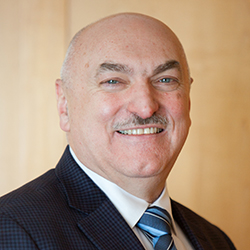New Center to Explore Effects of Telework, E-commerce on Travel Demand
Northwestern-led consortium will collaborate on research and outreach programs that assess future demand for travel and mobility
The Northwestern University Transportation Center (NUTC) has received a $1 million grant from the US Department of Transportation to launch a new Tier 1 University Transportation Center that will explore the effects of communications technology and e-commerce on travel demand in the wake of the COVID-19 pandemic.
The Northwestern-led consortium, which includes the University of California, Berkeley, and the University of Texas at Austin, will collaborate on research and outreach programs that assess how information and communication technologies and e-commerce processes will impact future demand for travel and mobility.
 “Our country is undergoing the broadest, deepest, and longest natural experiment in the use of communications and information technology for tele-activities and e-processes in modern history,” said Hani Mahmassani, William A. Patterson Distinguished Chair in Transportation, professor of civil and environmental engineering and (by courtesy) industrial engineering at Northwestern Engineering, and director of NUTC. “With the shift from telework to e-learning, telemedicine to e-shopping, and our heavy reliance on e-commerce and home delivery, activity and mobility patterns have dramatically transformed under current COVID-19 risk mitigation measures.”
“Our country is undergoing the broadest, deepest, and longest natural experiment in the use of communications and information technology for tele-activities and e-processes in modern history,” said Hani Mahmassani, William A. Patterson Distinguished Chair in Transportation, professor of civil and environmental engineering and (by courtesy) industrial engineering at Northwestern Engineering, and director of NUTC. “With the shift from telework to e-learning, telemedicine to e-shopping, and our heavy reliance on e-commerce and home delivery, activity and mobility patterns have dramatically transformed under current COVID-19 risk mitigation measures.”
Mahmassani is the principal investigator on the project and will direct the center, which includes faculty from the McCormick School of Engineering, Weinberg College of Arts and Sciences, and Kellogg School of Management.
The center will build on the expertise and broad research experience of its members to address key developments in both the supply of tele-activities — with an emphasis on e-commerce — as well as their impact on travel behavior and demand for transportation. The work will seek to answer three principal questions:
- To what extent are the changes in tele-activities and e-processes experienced during COVID-19 lockdowns likely to persist once restrictions are lifted and economies are reopened?
- How has the supply-side of e-commerce changed, and how will it likely evolve in the future?
- What is a desirable, but practically attainable, level of demand adoption (substitution) of tele-activities and e-services that can serve as a guidepost for planning decisions and policy intervention? How do these impacts differ across geographic entities, particularly in rural communities?
The center will develop and apply a general framework to characterize particular tele-activity and e-process domains, taking into account multiple considerations, including supply side delivery channels and modes likely to shape offerings to consumers, adoption and usage trends, COVID-19’s impact on supply-side reorientation and innovation and demand-side adaptation and resilience, forecasting demand and response to policies and incentives, and future scenarios to guide planning and policy design.
The center’s initial efforts will focus on e-commerce and telework and include a series of roundtable outreach events with domain experts to discuss major remote activities like e-learning, telemedicine, and e-sports. The center will also maintain an active advisory board with leaders from industry and local, state, and federal governments to guide research and outreach programs.
Other faculty involved in the center include Joseph Schofer, professor of civil and environmental engineering; Yu (Marco) Nie, professor of civil and environmental engineering; Pablo Durango-Cohen, associate professor of civil and environmental engineering; Amanda Stathopoulos, William Patterson Junior Professor and assistant professor of civil and environmental engineering; Karen Smilowitz, James N. and Margie M. Krebs Professor in Industrial Engineering and Management Sciences; Sunil Chopra, IBM Professor of Operations Management and Information Systems at Kellogg; and Ian Savage, professor of instruction at Weinberg.
